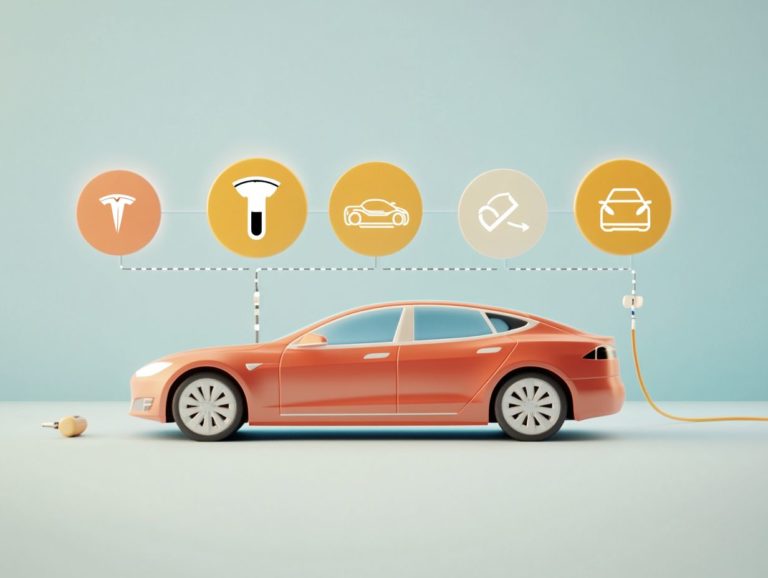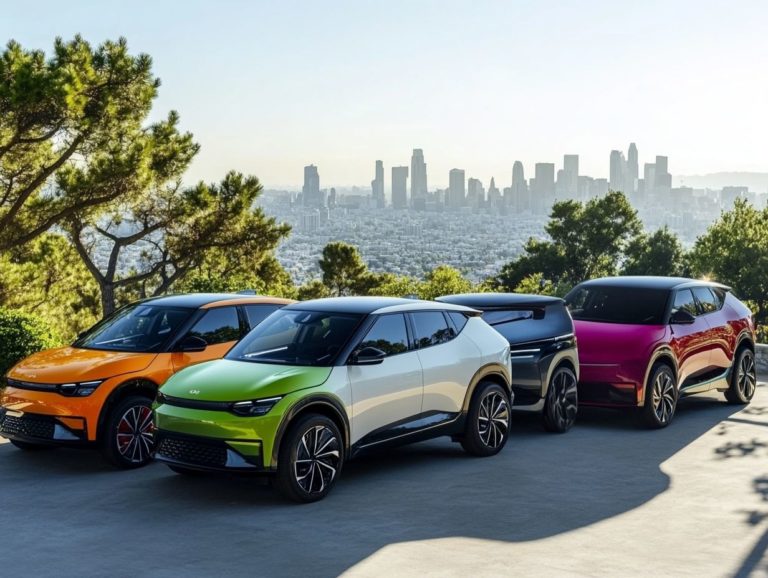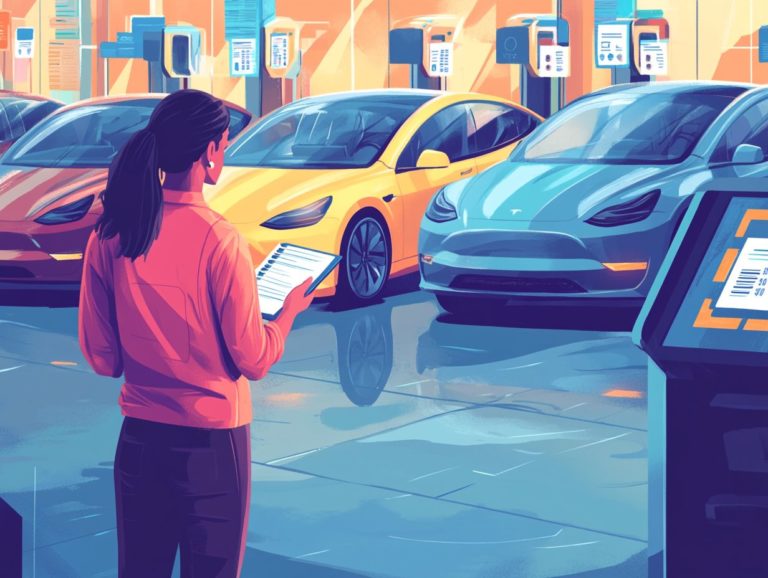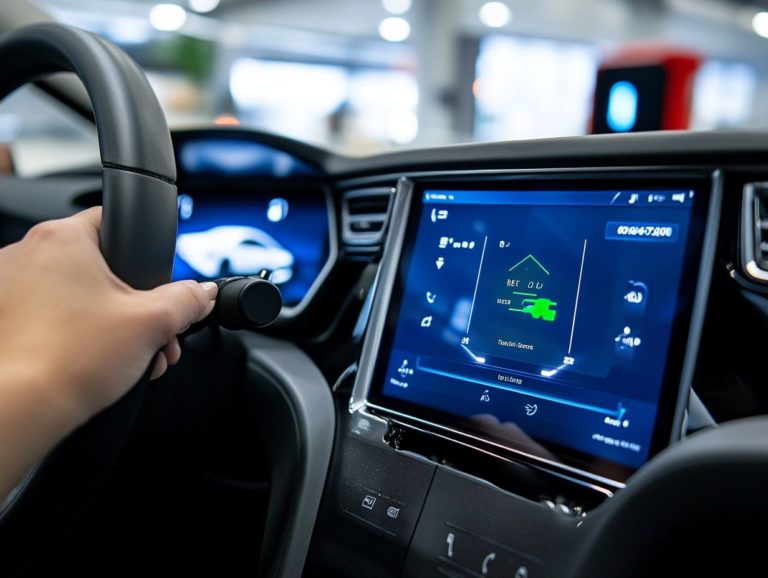how to choose the right electric vehicle for you
Electric vehicles (EVs) are reshaping the transportation landscape. They present a cleaner alternative to traditional cars while delivering a host of economic benefits.
In this article, you ll uncover the myriad advantages of owning an electric vehicle, ranging from environmental sustainability to significant cost savings. It also delves into crucial considerations to keep in mind when selecting the right EV for your lifestyle, such as range, charging options, and maintenance costs.
With a deep dive into the various types of electric vehicles and practical tips for evaluating your needs, you’ll be empowered to make a well-informed decision.
Are you ready to drive into the future?
Contents
- Key Takeaways:
- Benefits of Owning an Electric Vehicle
- Factors to Consider When Choosing an Electric Vehicle
- Types of Electric Vehicles
- How to Choose the Right Electric Vehicle for You
- Frequently Asked Questions
- What factors should I consider when choosing the right electric vehicle for me?
- What types of electric vehicles are available and how do they differ?
- What range should I look for in an electric vehicle?
- How do I find charging options for my electric vehicle?
- Are there any financial help or tax credits available for purchasing an electric vehicle?
- What maintenance and upkeep should I expect with an electric vehicle?
Key Takeaways:

Consider your daily driving range and charging options when choosing an electric vehicle to ensure it meets your needs and lifestyle. To make an informed choice, learn how to research electric vehicle options online and compare different models and features to find the best fit for you, whether it’s a battery electric vehicle, a plug-in hybrid, or a fuel cell electric vehicle. Electric vehicles offer economic and environmental benefits, so consider the potential cost savings and reduced carbon footprint when making your decision.
What are Electric Vehicles?
Electric vehicles (EVs) are revolutionizing modern transportation. They offer a diverse range of models, including vehicles that use both electricity and gasoline (hybrids), plug-in hybrids, and fully electric vehicles (BEVs). These eco-conscious alternatives to traditional gasoline-powered cars are designed to minimize tailpipe emissions. This plays a crucial role in the fight against climate change and global warming.
With every technological advancement, the driving experience and efficiency of EVs improve, making them an increasingly attractive option for discerning consumers. Their standout features include modern batteries that store more energy and last longer, which boost fuel economy and extend driving ranges between charges.
The growing network of charging stations in both urban and rural areas eases concerns about accessibility, making electric mobility a practical choice. By drastically reducing greenhouse gas emissions, EVs are integral to lowering the carbon footprint of transportation. Plus, their quiet operation reduces noise pollution and fosters a more serene urban environment.
This shift to electric mobility is not just a trend; it’s an exciting movement for a sustainable future. It underscores a commitment to cleaner air and a healthier planet.
Benefits of Owning an Electric Vehicle
Owning an electric vehicle (EV) offers a wealth of advantages that elevate your driving experience. You ll enjoy remarkable fuel economy improvements, translating to savings at the pump.
You may also qualify for tax credits and various incentives that enhance the cost-effectiveness of your vehicle ownership.
Embracing an EV not only benefits your wallet but also contributes to a more sustainable future.
Economic and Environmental Advantages
The economic and environmental advantages of electric vehicles (EVs) are compelling. By opting for an EV, you significantly reduce tailpipe emissions while enjoying impressive fuel economy benefits, which can lead to substantial savings over time.
With their remarkable ability to lower greenhouse gas emissions, EVs play a vital role in combating climate change an urgent concern for our planet. These vehicles produce zero tailpipe emissions and decrease reliance on fossil fuels, contributing to cleaner air and healthier communities.
Financially, you stand to benefit from various incentives, including generous tax credits and manufacturer discounts that lower the initial purchase price. A study by the Department of Energy reveals that EV owners save an average of $800 annually on fuel costs compared to their gasoline-powered counterparts.
This makes the shift to electric not just an ecological choice, but also a savvy economic decision. Don t miss out on the benefits of going electric!
Factors to Consider When Choosing an Electric Vehicle
When selecting an electric vehicle (EV), there are several crucial factors to take into account.
Consider your daily driving range needs, the accessibility of charging options in your area, and the overall cost and maintenance associated with owning the vehicle. For a comprehensive understanding, think about what to ask when buying an electric vehicle. Each aspect will play a significant role in ensuring your experience is both convenient and worthwhile.
Range and Battery Life

The range and battery life of your electric vehicle (EV) are crucial for your daily driving. With advancements in lithium-ion batteries, performance and longevity are better than ever.
For city drivers, having a reliable vehicle for short trips is essential. Those planning longer journeys will find battery capacity to be a key factor.
Some vehicles focus on getting the most out of their range, while others excel in quick charging. Proper battery maintenance is also important it can greatly extend the lifespan of your EV and ensure optimal performance.
Charging Options
Charging options are vital for electric vehicle (EV) practicality. You have a variety of solutions, from Level 2 chargers to smart charging systems.
Renowned networks like ChargePoint and Electrify America offer extensive fast-charging stations in urban areas and along highways.
If you prefer home charging, wall-mounted Level 2 chargers allow you to charge overnight. Smart charging technology optimizes the process by adjusting times based on electricity rates, grid demand, and renewable energy availability.
This ensures a cost-effective and efficient experience, allowing you to manage your charging schedule and cut expenses.
Cost and Maintenance
Evaluating the cost and maintenance of electric vehicles (EVs) is crucial for you as a potential buyer. These factors can significantly impact your overall ownership expenses, despite the appeal of fuel savings and tax credits.
When comparing the upfront price of EVs to traditional gasoline vehicles, it’s essential to look beyond the initial investment. Consider the long-term savings that can accumulate over time.
EVs generally have fewer moving parts, leading to lower maintenance costs. For instance, you won’t need oil changes, and regenerative braking a system that helps recharge the battery while you brake often leads to less wear on brake systems.
Several tax credits and government incentives can help reduce the purchase price, making this financial commitment more manageable for you. By considering these factors, you can gain a clearer understanding of the true cost of ownership, empowering you to make a more informed decision.
Types of Electric Vehicles
Electric vehicles (EVs) come in various categories, such as battery electric vehicles (BEVs), plug-in hybrid electric vehicles (PHEVs), and fuel cell electric vehicles (FCEVs).
Each type presents its unique features and advantages, carefully designed to cater to diverse driving preferences.
Battery Electric Vehicles (BEV)
Battery electric vehicles (BEVs) represent the pinnacle of electric vehicle technology. They rely solely on lithium-ion batteries that require recharging at designated charging stations. The beauty of this design is its commitment to zero tailpipe emissions.
This innovative approach offers substantial environmental benefits, helping to mitigate urban air pollution and reduce dependence on fossil fuels. However, you should weigh certain limitations as well.
Range anxiety is a common concern with BEVs. It can vary significantly based on driving conditions and your specific usage patterns. The availability of charging infrastructure is critical in your decision-making process.
Urban areas typically boast a robust charging network, but rural regions may fall short, posing challenges for long journeys. Nonetheless, despite these obstacles, the advantages such as sustainability and ongoing advancements in battery technology make BEVs an appealing choice for those who prioritize eco-friendliness.
Plug-in Hybrid Electric Vehicles (PHEV)

Plug-in hybrid electric vehicles (PHEVs) combine the benefits of electric vehicles (EVs) with traditional gasoline engines. They provide improved fuel economy and flexibility for longer journeys.
You can switch effortlessly between electric and gasoline power. This makes PHEVs perfect for diverse commuting needs.
For short urban trips, the electric mode offers a seamless, emissions-free experience. The gasoline engine is available for longer distances or when charging options are limited.
This adaptability enhances your convenience and eases the anxiety of fully electric models.
With a growing focus on sustainability, PHEVs are becoming an appealing choice for environmentally conscious drivers who value versatility.
Fuel Cell Electric Vehicles (FCEV)
Fuel cell electric vehicles (FCEVs) use hydrogen to generate electricity, offering zero tailpipe emissions. They represent a promising alternative in the electric vehicle (EV) market.
These vehicles convert stored hydrogen into electricity through a process that combines hydrogen with oxygen from the atmosphere.
One standout benefit of FCEVs is their rapid refueling time, comparable to traditional gasoline vehicles. This offers both convenience and efficiency.
FCEVs also provide longer driving ranges than many battery electric vehicles, making them an attractive option for long journeys.
However, challenges such as limited refueling infrastructure and sourcing hydrogen from renewable methods remain.
Addressing these obstacles is essential for the widespread adoption of FCEVs in the market for cleaner transportation alternatives.
How to Choose the Right Electric Vehicle for You
Selecting the ideal electric vehicle (EV) requires thoughtful evaluation of your unique driving needs. Consider the array of model options, your daily commuting distance, and check out this guide on how to choose the right EV based on your budget, especially if there are multiple vehicles in your household.
Assessing Your Needs and Lifestyle
Assessing your needs and lifestyle is a pivotal step in selecting the perfect electric vehicle (EV). This evaluation helps you find the best fit based on your driving habits and daily miles. Additionally, it’s essential to consider how to choose the right EV charger for your home to ensure a seamless charging experience. It also lets you consider if a car-free lifestyle might suit you better.
If you have longer daily commutes, you ll want an EV with an extensive driving range and fast charging capabilities. This allows for fewer stops to charge.
If you live in an urban area, you might weigh the costs of car ownership against the advantages of car-sharing services or public transportation. These can significantly reduce expenses related to fuel, insurance, and maintenance.
Your lifestyle, whether it involves frequent road trips or spontaneous weekend adventures, will influence your preferences for vehicle size and battery capacity. Additionally, understanding how to choose the right EV maintenance service is crucial for ensuring your vehicle meets your everyday needs. This thoughtful approach leads to a more personalized vehicle choice.
Comparing Models and Features
When comparing electric vehicle (EV) models and features, visit manufacturer showrooms, explore online dealers, and review specifications that fit your driving needs and budget. Additionally, check out how to find the best deals on electric vehicles for potential savings.
A comprehensive approach enables you to assess various options based on performance metrics like range, charging times, and acceleration.
For example, the Tesla Model 3 garners praise for its impressive range and advanced autopilot features. Meanwhile, the Ford Mustang Mach-E combines a sporty feel with a competitive price point.
Examining features such as battery capacity and in-car technology can substantially influence your decision-making process.
Pricing is another key element; being aware of available incentives can enhance the financial appeal of your choice.
A pivotal step in this evaluation is the test drive. This provides the opportunity to experience firsthand how these vehicles perform in real-world conditions, leading to a more informed and confident choice.
Frequently Asked Questions

What factors should I consider when choosing the right electric vehicle for me?
When choosing an electric vehicle, consider factors such as your budget, driving needs, and charging options. For more guidance, check out how to identify the right EV for your needs. These aspects will help you determine the right type and model for you.
What types of electric vehicles are available and how do they differ?
- Battery Electric Vehicles (BEVs): Run solely on electricity.
- Plug-in Hybrid Electric Vehicles (PHEVs): Have both an electric motor and a gasoline engine.
- Hybrid Electric Vehicles (HEVs): Use both electricity and gasoline to power the vehicle.
What range should I look for in an electric vehicle?
The range of an electric vehicle refers to the distance it can travel on a single charge. It varies by type and model. Consider your daily driving needs to choose a range that meets them without worry about running out of battery.
How do I find charging options for my electric vehicle?
You can charge your electric vehicle in various locations, including:
- At home
- At public charging stations
- At workplace charging stations
Use apps or online tools to locate charging stations near you, and consider installing a home charging station for convenience.
Are there any financial help or tax credits available for purchasing an electric vehicle?
Yes, numerous incentives exist for purchasing an electric vehicle! Research your area for available financial help, as these can make the cost much more affordable. Act now to grab the best deals available!
What maintenance and upkeep should I expect with an electric vehicle?
Electric vehicles generally require less maintenance than traditional gasoline cars because they have fewer moving parts and don t need regular oil changes. However, they still need regular tasks like tire rotations and brake checks. Follow the manufacturer’s recommended maintenance schedule for your specific vehicle.
Ready to find your perfect electric vehicle? Dive deeper into our resources, including how to compare electric vehicle ownership costs, or reach out for personalized guidance!






